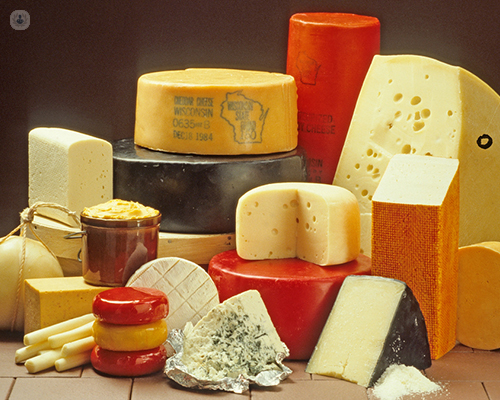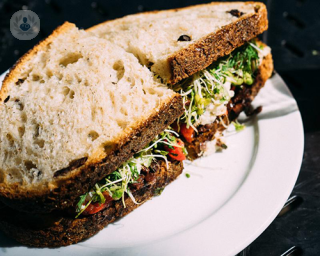What is food intolerance?
Food intolerance is the adverse reaction of the body to the intake of certain foods. It refers to a difficulty digesting particular foods.
Food intolerance is not the same as a food allergy. The latter triggers a much more rapid reaction in the immune system which is dangerous to the health. Food allergies cause hives, eczema, swelling and difficulty breathing, so it is urgent to seek urgent medical help because in these cases the patient's life is in serious danger. An intolerance, on the other hand, triggers an unpleasant physical reaction, but it is not dangerous.

What are the symptoms?
Symptoms can include:
- Diarrhoea
- Nausea
- Abdominal pain or bloating
- A headache
- Difficulty swallowing
- Fatigue
- Acne or other skin problems
Why does food intolerance happen?
The number of people who believe that they have an intolerance has risen in the last number of years. Some may assume that they have a food intolerance when their symptoms are actually unrelated – symptoms of food intolerance are very general and typical of many other conditions.
It is not clear why some are intolerant to particular foods. Some reactions may be to additives or chemicals in the food, such as MSG, histamines, artificial preservatives, or artificial flavouring. While intolerance can happen with any food, some of the most common foods that cause food intolerance are eggs, fish, milk, nuts, seafood, soy, gluten and some flours and yeasts.
What is the treatment?
When faced with any type of food intolerance, you should consult medical advice to help you to detect which food or foods cause the reactions. Testing can be carried out to help detect the problem, or your doctor may encourage you to keep a food diary to help pinpoint what is causing the intolerance. Treatment usually consists of following a diet in which the consumption of the substance or substances that cause the problem are avoided.
11-13-2012 07-28-2023Food intolerance
Dr Jonathan Henderson - Paediatrics
Created on: 11-13-2012
Updated on: 07-28-2023
Edited by: Sophie Kennedy
What is food intolerance?
Food intolerance is the adverse reaction of the body to the intake of certain foods. It refers to a difficulty digesting particular foods.
Food intolerance is not the same as a food allergy. The latter triggers a much more rapid reaction in the immune system which is dangerous to the health. Food allergies cause hives, eczema, swelling and difficulty breathing, so it is urgent to seek urgent medical help because in these cases the patient's life is in serious danger. An intolerance, on the other hand, triggers an unpleasant physical reaction, but it is not dangerous.

What are the symptoms?
Symptoms can include:
- Diarrhoea
- Nausea
- Abdominal pain or bloating
- A headache
- Difficulty swallowing
- Fatigue
- Acne or other skin problems
Why does food intolerance happen?
The number of people who believe that they have an intolerance has risen in the last number of years. Some may assume that they have a food intolerance when their symptoms are actually unrelated – symptoms of food intolerance are very general and typical of many other conditions.
It is not clear why some are intolerant to particular foods. Some reactions may be to additives or chemicals in the food, such as MSG, histamines, artificial preservatives, or artificial flavouring. While intolerance can happen with any food, some of the most common foods that cause food intolerance are eggs, fish, milk, nuts, seafood, soy, gluten and some flours and yeasts.
What is the treatment?
When faced with any type of food intolerance, you should consult medical advice to help you to detect which food or foods cause the reactions. Testing can be carried out to help detect the problem, or your doctor may encourage you to keep a food diary to help pinpoint what is causing the intolerance. Treatment usually consists of following a diet in which the consumption of the substance or substances that cause the problem are avoided.


Who really needs to eat gluten-free?
By Dr Aathavan Loganayagam
2025-01-20
It seems that gluten has developed a bad reputation these days, with many of us opting for gluten-free alternatives and cutting out a key part of our diet altogether. But does everyone really need to eat this way? Top gastroenterologist Dr Aathavan Loganayagam is here to explain the symptoms of the medical conditions that may require some people to eat a gluten-free diet. See more


Food allergy vs food intolerance: what is the difference?
By Professor James Lindsay
2025-01-19
In his latest online article, leading London-based gastroenterologist Professor James Lindsay explains the difference between food allergies and food intolerances. See more


Got a bellyache? A food intolerance may be the culprit
By Dr Aathavan Loganayagam
2025-01-19
Just how common is food intolerance, and what are the main symptoms? Read our latest article to find out the all-important questions about food intolerance, a condition that can cause extreme discomfort, particularly in the stomach. See more


Food intolerance or food allergy?
By Professor Stuart Bloom
2025-01-17
Food intolerances and allergies can have a serious impact on a person’s life, forcing them to plan their meals around avoiding certain foods. What are food intolerances and how are they different from allergies? Expert gastroenterologist Dr Stuart Bloom is here to explain. See more
Experts in Food intolerance
-
Professor Stuart Bloom
GastroenterologyExpert in:
- Inflammatory bowel disease (IBD)
- Irritable bowel syndrome (IBS)
- Acid reflux
- Digestive diseases
- Food intolerance
- Bowel cancer screening
-
Dr Andrew Fagbemi
Paediatric gastroenterologyExpert in:
- Inflammatory bowel disease (IBD)
- Food intolerance
- Acid reflux
- Constipation
- Irritable bowel syndrome (IBS)
- Capsule endoscopy
-
Dr Assad Butt
Paediatric gastroenterologyExpert in:
- Inflammatory bowel disease (IBD)
- Acid reflux
- Abdominal pain
- Food intolerance
- Diarrhoea
- Irritable bowel syndrome (IBS)
-
Professor Annette Fritscher-Ravens
GastroenterologyExpert in:
- Gastrointestinal endoscopy
- Irritable bowel syndrome (IBS)
- Food allergies
- Endoscopic ultrasound (EUS)
- Food intolerance
- Colonoscopy
-
Dr Nirit Braha
PaediatricsExpert in:
- Headache
- Chronic cough
- Allergic reactions
- Food intolerance
- Abdominal pain
- Bedwetting
- See all

Platinum Medical Centre (HCA)
Platinum Medical Centre (HCA)
15-17 Lodge Road, NW8 7JA
No existe teléfono en el centro.
By using the telephone number provided by TOP DOCTORS, you automatically agree to let us use your phone number for statistical and commercial purposes. For further information, read our Privacy Policy
Top Doctors

New Victoria Hospital
New Victoria Hospital
184 Coombe Lane West, Kingston upon Thames, KT2 7EG
No existe teléfono en el centro.
By using the telephone number provided by TOP DOCTORS, you automatically agree to let us use your phone number for statistical and commercial purposes. For further information, read our Privacy Policy
Top Doctors

The Wellington Hospital - part of HCA Healthcare
The Wellington Hospital - part of HCA Healthcare
Wellington Hospital South Bldg, 8A Wellington Pl, NW8 9LE
No existe teléfono en el centro.
By using the telephone number provided by TOP DOCTORS, you automatically agree to let us use your phone number for statistical and commercial purposes. For further information, read our Privacy Policy
Top Doctors
-
Platinum Medical Centre (HCA)
15-17 Lodge Road, NW8 7JA, Central LondonExpert in:
- Digestive
- Cancer
- Orthopaedic surgery
- Diagnostic Imaging
- Spine
- Physiotherapy
-
New Victoria Hospital
184 Coombe Lane West, Kingston upon Thames, KT2 7EG, South LondonExpert in:
- Cardiology
- General Surgery
- Orthopaedic surgery
- Breast augmentation
- Pain management
- Spine
-
The Wellington Hospital - part of HCA Healthcare
Wellington Hospital South Bldg, 8A Wellington Pl, NW8 9LE, Central LondonExpert in:
- Digestive
- Cardiology
- Orthopaedic surgery
- Orthopaedic spinal surgery
- Intensive care
- Spine
- Most viewed diseases, medical tests, and treatments
- Immunotherapy
- Alzheimer's disease
- Child nutrition
- Migraine
- Paediatric rheumatology
- Autoimmune diseases
- Joint pain
- Nutrition
- Weight loss injections
- Endermologie








